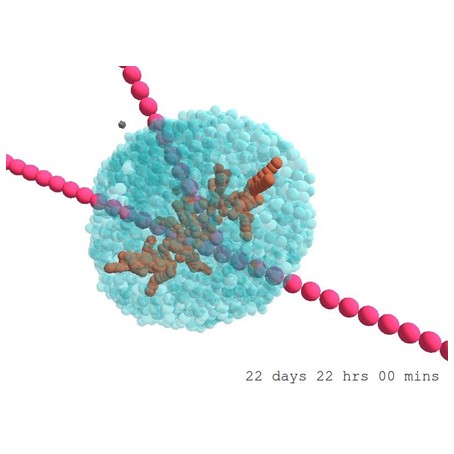Mensaje de error
- Notice: Trying to get property of non-object en menu_parent_ctools_access_check() (línea 64 de sites/all/modules/custom/euss_custom_ctools/plugins/access/menu_parent.inc).
- Notice: Trying to get property of non-object en menu_parent_ctools_access_check() (línea 64 de sites/all/modules/custom/euss_custom_ctools/plugins/access/menu_parent.inc).
Simulation by agents
Research in this area is intended to improve solutions provided by Life Sciences through the application of computational thinking and performance engineering to adapt them to current computer systems.
- Inicio
- Simulation by agents
Share
Research description
High performance computing and the evolution of computing systems have allowed great advances in science and, in general, in our society. High Performance Computing has fostered new treatments for incurable diseases, new much more efficient systems as means for energy consumption and it has been possible to determine the evolution of the universe.
This development of computer systems has been determined to a large extent by the great amount of innovations added in its components, but also by an evolution towards large scale distributed systems. So today, it is possible to have data stored in the cloud without knowing particular data locations and run applications that return results without users knowing where these applications have been executed.
These new paradigms have made large-scale computing available to a large number of users who did not have the possibility of acquiring a high-performance computer to run their applications. This new processing capacity, which we have already integrated into an endless number of aspects of our daily life, will be increased by the new possibilities offered by current systems. From there, new systems will integrate embedded elements with capacity for sensing the physical world together with advanced computation, communication and storage systems. These systems will be available in the cloud in the form of services open to users. These new paradigms in which computation and storage must be managed effectively and efficiently to provide solutions to tangible problems in our society, require the integration of the most appropriate elements with the most advanced techniques, methodologies and technologies.
In this context, this research line, focusing on the information and communication technologies as enabling bases, addresses the challenges of the digital society, including the challenges of the H2020 society and the Spanish strategy for science and technology and innovation. In particular, the following challenges are considered:
· The environment, with the problems caused by natural disasters such as forest fires, improving automatic systems to detect and predict the evolution of this type of catastrophe, and the preservation of biodiversity.
· Health with the development of new tools, using for example an agent-based modeling and simulation (ABMS) approach, to improve the treatment of certain diseases and the follow-up of patients with telemedicine environments.
· Intelligent transport and the development of autonomous vehicles that can offer a safer and more efficient means of transport that are able to perceive the complexities of their surroundings and act accordingly in real time.
· The digital society and social networks, in particular, in order to extract knowledge and information from the published messages so that it allowed to make predictions about people’s behaviour or markets, by applying additionally suitable security and scalability policies.
In all the challenges, we present a holistic view of the problem, which considers aspects related to the available computational platforms, the efficient management of computational resources, the adequate models and paradigms of computation and our own applications, in order to give answers to the challenges posed.
Current projects
-
“Computación avanzada para los retos de la sociedad digital”, PID2020-113614RB-C21, Ministerio de Ciencia e Innovación”, Antonio Espinosa Morales / Anna Barbara, 2020-2023
-
SGR-HPCA4SE, Generalitat de Catalunya, Departament d'Arquitectura de Computadors i Sistemes Operatius (DACSO), Universitat Autònoma de Barcelona, Barcelona, IP: Tomas Margalef
Researcher EUSS

Relevant publications
- “Designing a benchmark for the performance evaluation of agent-based simulation applications on HPC", A. Moreno, J.J. Rodríguez, D. Beltrán, A. Sikora, J. Jorba, E. César, Journal of Supercomputing, 75(3), 1524-1550, (2019)
- "HeDPM: load balancing of inear pipeline applications on heterogeneoussystems", A. Moreno, A. Sikora, E. César, J. Sorribes, T. Margalef, Journal of Supercomputing, 73, 3738–3760 (2017)
- "Dynamic tuning of the workload partition factor and the resource utilization in data-intensive applications", Claudia Rosas, Anna Sikora, Josep Jorba, Andreu Moreno, Antonio Espinosa, Eduardo Cesar, Future Generation Computer Systems, 37, 162-177 (2014)
- "Load balancing in homogeneous pipeline based applications", A. Moreno, E. Cesar, A. Guevara, J. Sorribes and T. Margalef, Parallel Computing, 38, 125–139 (2012)
- "Distribution using Factoring Load Balancing in Master-Worker Applications", A. Moreno, E. Cesar, J. Sorribes and E. Luque, Information Processing Letters, 109, 902-906 (2009)
- "Modeling Master/Worker applications for automatic performance tuning", E. Cesar, A. Moreno, J. Sorribes and E. Luque, Parallel Computing, 32, 447-626 (2006)
Collaborations
Main collaboration
- Grup de recerca HPCA4SE. Departament d'Arquitectura de Computadors i Sistemes Operatius (DACSO). Universitat Autònoma de Barcelona, Barcelona; Dr. Tomàs Margalef
Other collaborations:
- Participation in a Group on Corporative Social Responsability


